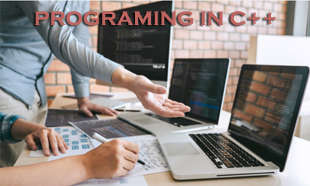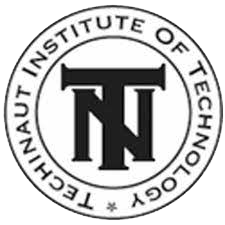PROGRAMMING COURSE IN C++
In the ever-evolving landscape of computer programming, mastering a versatile and powerful language like C++ opens doors to endless possibilities. BOSCOTECH, a renowned computer institute franchise, offers a specialized six-month "Programming Course in C++" to equip aspiring programmers with the skills and knowledge needed to excel in the field. Situated in Tarapur-Khelma, Cachar, Assam, under the banner of Techinaut Institute of Technology, this Course serves as a gateway to the world of software development. Let's delve into the objectives and curriculum of this transformative Course.
THE OBJECTIVE OF THE COURSE:
The "Programming Course in C++" aims to provide participants with a comprehensive understanding of the C++ programming language, its core concepts, and practical applications. By the end of the Course, students will:
- Gain proficiency in C++ programming fundamentals and syntax.
- Understand the principles of object-oriented programming (OOP) and apply them to develop efficient and modular code.
- Learn advanced C++ concepts such as pointers, arrays, function overloading, inheritance, polymorphism, templates, and exception handling.
- Develop problem-solving skills and the ability to design and implement software solutions using C++.
- Acquire hands-on experience through practical exercises, projects, and real-world applications.
- Prepare for career opportunities in software development, game development, system programming, and other domains requiring C++ proficiency.
SECTION 1: INTRODUCTION TO C++
The Course begins with an overview of the C++ programming language, its history, and its significance in software development. Participants learn about the key features of C++, its role in modern programming paradigms, and its advantages over other languages.
SECTION 2: OBJECT-ORIENTED PROGRAMMING CONCEPTS
Object-oriented programming (OOP) is a fundamental paradigm in C++ programming. Students delve into OOP concepts such as classes, objects, encapsulation, inheritance, and polymorphism. They understand how to design and implement modular and reusable code using OOP principles through theoretical explanations and practical examples.
SECTION 3: THE BASICS OF C++
Building upon the foundational knowledge acquired in the previous sections, participants explore the basics of C++ programming. Topics covered include data types, variables, constants, operators, control structures, loops, and input/output operations. By mastering these fundamental concepts, students lay the groundwork for advanced C++ programming.
SECTION 4: WORKING WITH OPERATORS AND EXPRESSIONS
Operators are essential for performing operations on data in C++ programs. In this section, students learn about arithmetic, relational, logical, assignment, and bitwise operators and their precedence and associativity rules. They also explore expressions, type conversions, and operator overloading techniques to enhance code readability and efficiency.
SECTION 5: CONTROLLING THE PROGRAM FLOW
Control structures allow programmers to dictate the flow of execution in C++ programs. Participants learn about decision-making constructs such as if-else statements, switch-case statements, and conditional operators. Additionally, they explore loop constructs like while, do-while, and loops to implement iterative algorithms efficiently.
SECTION 6: USING FUNCTIONS/PROCEDURES
Functions are crucial in modularizing code and promoting code reusability in C++. Students learn how to define, declare, and call functions, pass arguments, and return values. They also explore function prototypes, scope rules, and recursion techniques to effectively solve complex programming problems.
SECTION 7: POINTERS AND ARRAYS
Pointers and arrays are powerful features of C++ that allow for dynamic memory allocation and efficient data manipulation. Participants delve into pointers, pointer arithmetic, and memory management. They also explore arrays, multidimensional arrays, and pointers to arrays, gaining insights into their applications in data structures and algorithms.
SECTION 8: BINDING DATA AND FUNCTIONS
In this section, students learn about data encapsulation and access control mechanisms in C++. They explore class and object concepts, constructors, destructors, access specifiers (public, private, protected), and friend functions. Understanding these concepts allows them to design robust and secure C++ classes for real-world applications.
SECTION 9: FUNCTION AND OPERATOR OVERLOADING
Function and operator overloading are essential techniques for enhancing code readability and reusability in C++. Participants learn how to overload functions and operators to support multiple data types and argument variations and explore the benefits and limitations of overloading in C++ programming.
SECTION 10: REUSING CLASSES
Inheritance is a critical concept in object-oriented programming that promotes code reuse and extensibility. Students explore inheritance relationships, base and derived classes, member access control, and virtual functions. They also learn about polymorphism and dynamic binding, enabling them to design flexible and scalable class hierarchies in C++.
SECTION 11: VIRTUAL FUNCTIONS AND POLYMORPHISM
Polymorphism is a cornerstone of object-oriented programming, allowing objects of different types to be treated interchangeably. Participants learn about virtual functions, function overriding, and runtime polymorphism in C++. They explore the concept of dynamic binding and its implications for designing modular and extensible software systems.
SECTION 12: TEMPLATES, EXCEPTION HANDLING, ETC.
Templates and exception handling are advanced features of C++ that enhance code flexibility and robustness. Students explore template classes, function templates, and template specialization to create generic algorithms and data structures. They also learn about exception-handling mechanisms, including try-catch blocks, throw statements, and exception specifications, to handle runtime errors gracefully.
CONCLUSION:
The "Programming Course in C++" offered by BOSCOTECH at the Techinaut Institute of Technology in Tarapur-Khelma, Cachar, Assam, provides a comprehensive and structured learning experience for aspiring programmers. By covering a wide range of topics, from basic syntax to advanced concepts like OOP, pointers, inheritance, and polymorphism, this Course equips participants with the skills and knowledge needed to excel in C++ programming. Through hands-on practical exercises, projects, and real-world applications, students emerge from the Course with a deep understanding of C++ fundamentals and the confidence to tackle complex programming challenges in diverse domains. Whether aspiring to pursue a career in software development, game programming, or system engineering, graduates of this Course are well-equipped to thrive in the dynamic and competitive field of computer programming.
 ADVANCE DIPLOMA IN COMPUTER APPLICATION PCCC
1 × ₹13,000.00
ADVANCE DIPLOMA IN COMPUTER APPLICATION PCCC
1 × ₹13,000.00  DIPLOMA IN COMPUTER APPLICATION (SRKI)
1 × ₹10,000.00
DIPLOMA IN COMPUTER APPLICATION (SRKI)
1 × ₹10,000.00  ADVANCE DIPLOMA IN FINANCIAL APPLICATION (VITA)
1 × ₹3,200.00
ADVANCE DIPLOMA IN FINANCIAL APPLICATION (VITA)
1 × ₹3,200.00  ADVANCE EXCEL (CDCO)
1 × ₹13,000.00
ADVANCE EXCEL (CDCO)
1 × ₹13,000.00  COMPUTER TYPING (SRKI)
1 × ₹10,000.00
COMPUTER TYPING (SRKI)
1 × ₹10,000.00  TALLY CECD
1 × ₹4,000.00
TALLY CECD
1 × ₹4,000.00  DIPLOMA IN FINANCIAL APPLICATION AGOE
1 × ₹13,000.00
DIPLOMA IN FINANCIAL APPLICATION AGOE
1 × ₹13,000.00 

